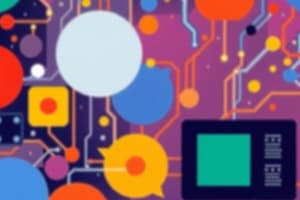Podcast
Questions and Answers
What is the digital divide and how does it impact opportunities?
What is the digital divide and how does it impact opportunities?
The digital divide refers to the unequal access to technology and internet connectivity, leading to disparities in opportunities for education, employment, and information access.
Explain one major security issue related to ICT.
Explain one major security issue related to ICT.
One major security issue is the risk of cyberattacks, which can lead to data breaches and compromise sensitive information.
Describe the relationship between big data analytics and decision-making.
Describe the relationship between big data analytics and decision-making.
Big data analytics involves analyzing vast datasets to extract valuable insights that can significantly improve decision-making processes.
What role does artificial intelligence play in future trends of ICT?
What role does artificial intelligence play in future trends of ICT?
Define digital literacy and its significance in today's society.
Define digital literacy and its significance in today's society.
What does ICT stand for and what are its primary components?
What does ICT stand for and what are its primary components?
List three examples of hardware in an ICT system.
List three examples of hardware in an ICT system.
How does software contribute to the functionality of ICT systems?
How does software contribute to the functionality of ICT systems?
What role do networks play in ICT?
What role do networks play in ICT?
Identify two sectors where ICT applications have made significant impacts.
Identify two sectors where ICT applications have made significant impacts.
What are two benefits of using ICT in business operations?
What are two benefits of using ICT in business operations?
Explain how ICT enhances collaboration among teams.
Explain how ICT enhances collaboration among teams.
Mention one way ICT has transformed communication.
Mention one way ICT has transformed communication.
Flashcards
What is ICT?
What is ICT?
Information and Communication Technology encompasses all the tools and resources used for storing, retrieving, transmitting, and processing data.
What is hardware?
What is hardware?
Hardware refers to the physical components of a computer system or other digital devices, like the CPU, memory, storage, input and output devices.
What is software?
What is software?
Software consists of the instructions that tell the hardware what to do. Examples include operating systems, applications, and programming languages.
What is a network?
What is a network?
Signup and view all the flashcards
How does ICT benefit education?
How does ICT benefit education?
Signup and view all the flashcards
How does ICT benefit businesses?
How does ICT benefit businesses?
Signup and view all the flashcards
How does ICT benefit healthcare?
How does ICT benefit healthcare?
Signup and view all the flashcards
How does ICT benefit communication?
How does ICT benefit communication?
Signup and view all the flashcards
Digital Divide
Digital Divide
Signup and view all the flashcards
Digital Literacy
Digital Literacy
Signup and view all the flashcards
Communication
Communication
Signup and view all the flashcards
Information
Information
Signup and view all the flashcards
Technology
Technology
Signup and view all the flashcards
Study Notes
Introduction to ICT
- ICT stands for Information and Communication Technology.
- ICT encompasses tools for data management: hardware, software, and networks.ICT plays a crucial role in various aspects of modern life, including communication, education, business, entertainment and healthcare.
Key Components of ICT
- Hardware: Physical components of a computer system or other digital device
- Examples include: central processing unit (CPU), memory (RAM), storage devices (hard drives, SSDs), input devices (keyboard, mouse, microphone), output devices (monitor, printer, speakers).
- Software: Instructions that tell the hardware what to do
- Includes operating systems (like Windows, macOS, Linux), applications (like word processors, web browsers, games), and programming languages.
- Networks: Interconnections that allow various devices to communicate
- Examples include the internet, intranets, and local area networks (LANs). These networks facilitate data transfer and sharing.
ICT Applications in Different Sectors
- Education: ICT improves learning through interactive tools, online resources, and digital classrooms. Remote learning and collaboration are enhanced.
- Business: Businesses use ICT for operations like sales, marketing, customer service, and inventory management. Automation and data analysis are key benefits.
- Healthcare: ICT supports diagnostics, patient records, telehealth, remote monitoring, and medical research.
- Communication: ICT enables faster and more efficient communication through email, messaging apps, video conferencing, and social media.
- Entertainment: ICT provides access to movies, music, games, and other forms of media through platforms like streaming services and online gaming.
Benefits of ICT
- Increased Productivity: Automation and efficiency gains in various tasks.
- Improved Communication: Faster and wider communication across geographic boundaries.
- Enhanced Collaboration: Easier teamwork through shared resources and online tools.
- Access to Information: Global access to information and knowledge resources.
- Cost Savings: Automation and digital tools can save money in the long run.
Challenges of ICT
- Digital Divide: Unequal access to technology and internet connectivity, creating an inequality in opportunities.
- Security Issues: Risk of cyberattacks, data breaches, and online threats.
- Privacy Concerns: Data collection and use issues related to user privacy.
- Ethical Considerations: Ethical dilemmas surrounding artificial intelligence, data manipulation, and misinformation.
- Dependence and Addiction: Over-reliance on technology and potential for addiction.
Future Trends in ICT
- Artificial Intelligence (AI): AI is rapidly evolving and impacting many aspects of ICT, from personal assistants to automation in business processes.
- Internet of Things (IoT): Growing interconnectedness of devices and objects, enabling smart homes, cities, and industries.
- Big Data Analytics: Analysis of vast datasets to extract valuable insights and improve decision-making.
- Cloud Computing: Storing and accessing data and applications over the internet.
- Mobile Technologies: Increased use of smartphones and tablets for communication, productivity, and entertainment.
Key Concepts Within ICT
- Data: Raw facts and figures that need processing or storage.
- Information: Organized data that has meaning and context.
- Communication: The process of exchanging information.
- Technology: The application of scientific knowledge for practical purposes.
- Digital Literacy: The ability to use technology effectively and critically.
Studying That Suits You
Use AI to generate personalized quizzes and flashcards to suit your learning preferences.




